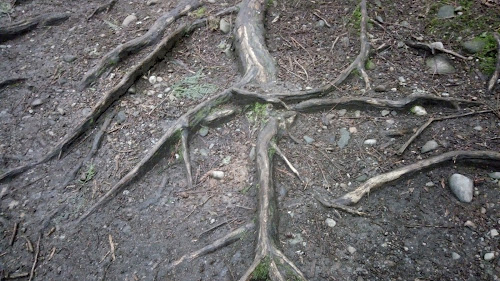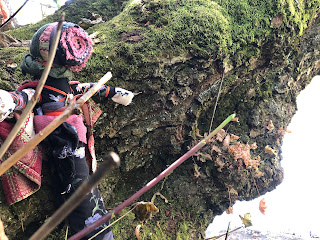Ceremonies of Reparation
BACKGROUND
I wanted to let you know something of my personal work in the year to come.
In 2009-2013, I was living in WSANEC/ Malahat/ Tsartlip traditional territory, next to Goldstream and Gowland Todd parks. I formed a very deep bond with the land
there, and in particular, an ongoing apprenticeship-relationship with
q’ut’q’ut’a’ulhp (honeysuckle), whom I refer to as “Ma.”
In 2013, I moved to Quw’utsun’ territory, and have lived,
walked and learned in many locations – primarily locations in the Koksilah
watershed as well as the Bonsall Creek watershed, as well as Maple Bay and
Cowichan Bay. I have dreamed with the land
and ancestors of these lands in each place I have spent significant time with.
When I first lived at the far tip of Kwa’mutsun Xastu –
Quamichan Lake – ancestors of that location came to me in a powerful dream of a
girl and her grandfather from thousands of years ago. There was something unsettled there, that
they were showing me. For all of my
prayers and ceremonies, I could feel that the spirits of the land needed to
hear from someone whose roots and medicine went much deeper than my own there. I requested Della Rice Sylvestor to walk with
me on the land, to sing and pray to the trees and stones and land itself. Since that time, Della and her sister CJ, have
been important guides, mentors and friends, helping to navigate and slowly
learn some cultural protocol, so as to walk with respect and care in this territory. Two years ago, after a particular experience
in prayer with a different piece of land, I requested to root my ancestral
medicine more deeply here in order to better and more fully serve the land and
various people I work with.
I do not think I actually knew, at the time, what I would
be stepping into with that request. I
only had a small comprehension of what it meant and likely still only have a
small idea of it.
One thing I have come to understand, since then: holding
sacred knowledge, the land, and relationship to Spirit in the centre of my
heart and life is complex. It means that
I can only root into my own ancestral sacred knowledge if I am in right-relations
with the land and spirits of the land…
Which means that I must also be in right-relations with the ancestors of
the land and the peoples of these lands.
And I must be in right-relations with my own ancestors, and their
relations with lands they lived upon, since those relationships eventually gave
rise to my existence…
The Land Speaks trilogy I am writing is a way of
addressing my own ancestors and their relationships with the lands and people’s
they shared time and space with when they arrived in Treaty 1 territory in
1910. The books also look at the
repeated patterns in my own life – the parallels and echoes in blood and bone
memory 100 years later.
I have just entered menopause this past year, and
according to my ancestral traditions, this is a significant time – a “rite of life”
as they call it – to more fully embodied sacred knowledge. And so, as part of my menopausal “graduation”
I am undertaking a year of ceremony, to make personal reparation with the lands
I have related to on Vancouver Island.
(I hope, if it is possible over time, to do this with all territories
and locations from my lifetime…)
Altogether there are 13 locations on Vancouver Island I will visit over
13 new moons between my 53rd and 54th birthdays – to make
apologies for any ignorance and disharmony I have carried or caused in that
location, to show gratitude for how I was held, supported, and taught in that
location, and to make commitments to walk in right relations, with integrity
and respect as best I can ongoingly.
My plan is to make a Motanka (traditional and sacred doll
– different dolls are made for different seasonal and life rites, and various
healing needs) and Pysanka (traditional and sacred egg with symbols “written”
(Pysaty: to write) on it) for each ceremony.
There are many ways to work with the Motanky and Pysanky when using them
for land healing and protection – one way is to bury them (with permission,
offerings and prayer) in a place that no one will trample over. I will ask each location permission, and then
ask the land to show me where to bury the Motanka and Pysanka. I will bury them near the surface, as my
roots and medicine do not belong any deeper.
I must remember and acknowledge the depths, for example, of the
Quw’utsun’ people’s relationship and medicines within their traditional
territory, and that I remain a guest here.
CEREMONY #1, SEPT. 6
The first location falls within the Koksilah watershed, next to the Koksilah River – Xwulqw’selu Sto’lo in Hul’quimi’num. I encourage anyone wanting to learn more about the Qu’wutsun’ culture, language, and traditional territories to please visit Qustenuxun (Jared) Williams’ writings or attend any of Della Rice Sylvester’s workshops. (See the bottom of this page for links.)
This particular location and grove of trees hold me often. (Those who work with me in-person may recognize it!) I have so much gratitude for the safety, protection, teaching and support they provide.
The Motanka I made is a “temporary” doll, one that is intended to either be burned, buried, or dismantled. She is bound, not sewn. The threads are wound with prayer, in the “east to west” direction, which infuses her with the solar movements across the sky – basically, the cycles and movements of nature. Her body is made in the form of a solar-cross. Like the trunk of a tree, she connects the realms (upper, middle, and lower realms) as well as the cosmic forces to the earth, and her arms outstretch like the horizon of Mati Zemlya (Mother Earth). She is faceless – rather than using threads to create a pattern on her face, temporary Motanky are “less fancy” so as to avoid wasting precious fabric/ thread. The blank face means that she will not take on the spirit of her maker. Rather, the blank face (or pattern if she had one) acts as a portal and binding for ancestral wisdom to reside within. She has an “x” on her chest where her shirt is bound by thread. This is a symbol of Mati Zemlya that dates back to Trypillian culture (up to 40,000 years old). She wears bells on her arms – a sound that brings both protection and cleansing.
The Pysanka that I made is a raw egg from one of our farm
chickens. The egg itself is also a
solar-symbol – with the yellow yolk within representing the sun. The shell is “protective”, and the egg in its
wholeness represents fertility, for obvious reasons. In Ukrainian tradition, the egg is “written”
upon using a Kistka (tool) and beeswax (also associated with the sun,
protection and fertility). The egg is
then dipped in dye, the wax removed, and patterns written are revealed. I chose to write both a coniferous and deciduous
tree, to represent the “Tree of Life” and also to represent the trees who hold
me so lovingly at this location. I divided
the egg into 3 sections. The upper two
portions hold the two trees. The lower
section represented (to me) the lower realm, as well as the waters of the unconscious. It seemed to have a life of its own when I drew
it and then melted the wax off, which had its own significance to me and
related to an experience I had in the early spring with this grove.
I was visiting the grove for the first time since the
winter rains subsided and the river shrank back to its “normal” channel (in the
winter, this location is inaccessible as the river rises, overflowing its banks
to flood the grove). As I entered the
grove, I could feel that the trees wanted me to make a special offering in
acknowledgement and greetings. In fact,
they wanted three offerings. I had
decided to visit the grove to do an audio recording that gets sent to students
and clients weekly, and so got caught up in making the recording. As is common with my menopausal brain these
days, I promptly forgot the request for offerings, and so upon completing the
recording, I turned to leave. As I stepped
down the small hillside, the ground literally melted under my feet and I slid
and thumped on my bottom and side down the little hill. Standing, covered in mud and bruised at the
hip, I immediately remembered the request and knew that I had offended
the trees. I turned to them, made
apologies aloud, and reached for special offerings I had brought with me. As I attempted to walk, the ground continued
to liquify under me. Attempting to reach
the first tree, I had to hold onto roots and branches so as not to continue
sliding. I gifted the offering, made
apologies, and the ground became slightly more solid. I carefully approached the second tree, repeating
offering and apology. Again, the ground solidified
a bit more. The third offering and
apology was made at the third tree, and the ground became fully solid. I was a bit apprehensive of stepping down the
hill again, but all was fine by this time.
I was still covered in mud and bruised – a reminder never to ignore the
directive of the trees and spirits of a place!
(The cloth that was used to wipe the Pysanka (seen in the
first photo of the article, marked with black wax and pink dye) is considered
sacred and can be used to “wipe away” illness and negativity – and will be kept
for this purpose.)
I realised I had forgotten to bring a trowel, and so
chose a stick I might be able to dig a shallow hole with. However, as it turned out, there was a natural
hole I had never seen before under the fallen tree stump where I would place
the Motanka and Pysanka. The rest of the
photos show the burial of the Motanka and Pysanka and my time with the grove of
trees.
As final thoughts, I encourage you to connect with your own ancestry and sacred practices, and to also learn about the territory, protocol and people’s whose lands you live and work upon.
Thank you, Dyakuyu, Huy ch q’u
In Earth Blessings and love,
Nikki
Jared:
https://m.facebook.com/jared.q.williams?tsid=0.4068201766114381&source=result
https://www.patreon.com/qwustenuxun
Della:
https://m.facebook.com/profile.php?id=100029556009343&ref=content_filter



























Comments
Post a Comment